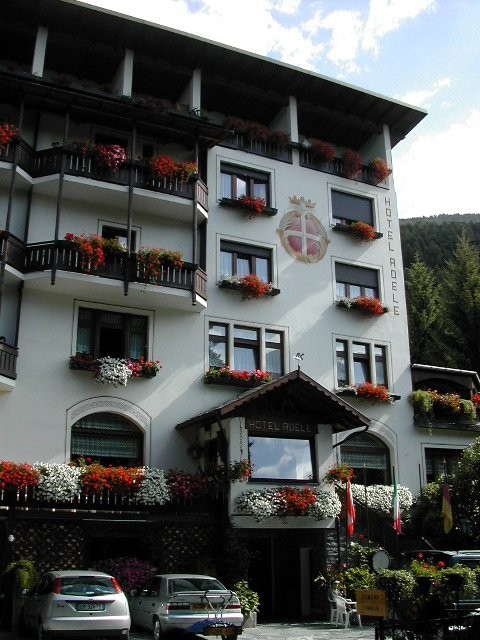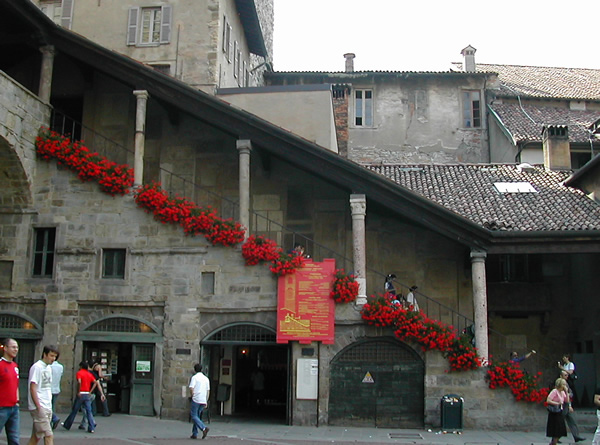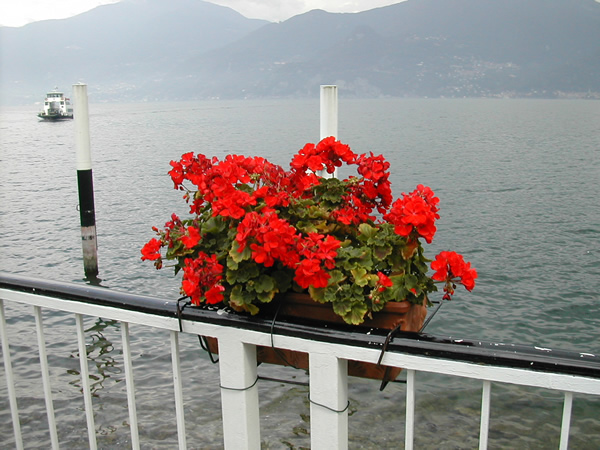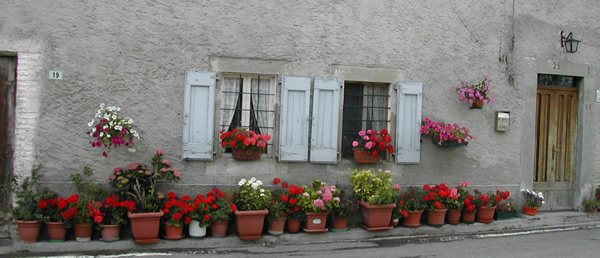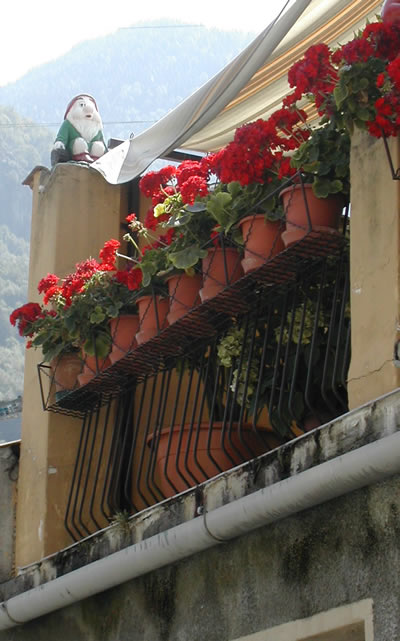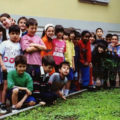I have been living in Italy long enough for this to be my fourth World Cup. And, to my own surprise, I’ve grown to enjoy it and actually care about who wins, even though most of the finer details still escape me. Aside from a passing interest in Olympic equestrian events (when I can get them) and figure skating, World Cup football is the only sport I watch. So the experience of being actively interested in a sporting event is a new country for me to explore.
The World Cup has, appropriately enough, followed me around the world. For the earlier games of the 1994 World Cup, I was home in Milan, during a typically hot, humid summer. We lived in an 8-story apartment building with windows looking onto the same courtyard as four similar buildings, and of course everyone had their windows open. So, when Italy scored, it was a community event: we heard the whole neighborhood erupt in cheers.
For the final games, I was in California for work, staying (as usual) at Fabrizio’s large house in San Jose. The whole gang of Italian staff and their families transplanted to California for Incat Systems, plus me, watched the Brazil-Italy final together on Fabrizio’s big TV.
In 1998 I was back in California for work (I spent a large part of each summer there from 1994-2000) for at least part of the Cup – I remember watching the Iran-US game with a Woodstock friend at his house, but I’m pretty sure I was home in Italy when France won the final (or was that in 2002?). I was sardonically amused by the fact that France, so protective of its lily-white Frenchness, won largely thanks to its team members of north African descent. French president Chirac’s habitually sour expression barely changed as he watched the victory from a privileged seat in the stands, and I wondered if he was sucking on the sour lemon of realization that these “colored” people have much to contribute to France.
Even funnier was the after-show footage shot in the Paris pubs, of drunken revelers singing “We Are the Champions” – in English. So much for French Anglophobia.
I got interested in those games as I watched them, but the fact that I watched them was almost accidental. This year is different: I am actually keen to see the Italy games – and not just when it lets me take an hour and a half out of the workday. Fortunately, I’m not alone in this. We had the Italy-Czech game on at the office, and anyone who wanted to was welcome to watch it, alongside the boss. I left early to be home in time to watch most of the Italy-Australia game (which started at 5 pm on a workday), and I wasn’t the only one – there was an unusually early traffic jam in Lecco as I was riding home on the bus.
The usual Italian soccer season leaves me cold because, just as in American professional sports, who wins seems to depend more on the club’s business savvy (keeping enough money rolling in that you can buy the best players) than any real local affiliation – why should the Milanese root for the Milan team, whose “greatness” is simply a reflection of Berlusconi’s bankroll? I doubt there’s a single actual Milanese on the team, and perhaps there never has been. (I groused about this years ago, see below.)
Much the same is true of most Olympic events: countries that pour money into certain sports (whether as individuals or as governments, viz China) tend to win those events. Sports that require specialized equipment or locations (skis, snow, ice rinks) are won by wealthy countries that can afford those things.
Some Olympic events are more democratic. Kenyans can win marathons thanks in part to genetic ability, and in part to living at an altitude which helps them train. They don’t even need expensive shoes: they’re used to running barefoot. On the other hand, a natural-born Kenyan ice skater won’t be recognized anytime soon, because he or she may never see an ice rink.
Football, too, is a leveller. It doesn’t take much equipment to practice, so good players can be found in all corners of the world and all walks of life (a couple of Italy’s players grew up in poor neighborhoods in Rome, such as Totti who, back home, is the butt of jokes for his fractured Italian grammar). The professional teams scout far and wide, so you get Ghanaians playing in England, English playing in Spain, Ukrainians playing in Italy… Then, when it’s World Cup time, the best go home and play for their national teams.
This contrasts with the Olympic ideal of “amateurism”, which I’ve never understood – perhaps someone can explain it to me. Professional athletes can’t participate in the Olympics, yet many who compete do nothing but their sport, even if they don’t draw a direct salary for it. So I don’t understand where that line is drawn between “professional” and “amateur”.
In World Cup football, you’re actually seeing the best of the best, re-sorted from the wealthy clubs into national teams. I don’t know if or how much the players get paid for playing on their national teams, but to be chosen is an honor – the players are felt to be representing their countries. National flags, normally scarce in Italy, are brought out for the World Cup (and sometimes hung upside down or backwards, to the dismay of Italy’s few keen patriots).
It’s interesting to observe societal differences on the field. The US team is multicolored, with a range of surnames reflecting the melting pot of American society. The French team is similarly integrated although, as mentioned, not all the sons of France seem happy about this. The Italian team, on the other hand, does not feature a single player who is not ethnically Italian with an Italian surname. The most we can say is that the players are drawn from all parts of Italy – and, to a Milanese, Naples might as well be a foreign country.
Part of the joy of watching football, to me at least, is the uncertainty – it ain’t over til it’s over, and a goal in the last 30 seconds can turn a game upside down. A formerly-overlooked country can score a surprising win against the team everyone assumed was going to win. I enjoy rooting for the underdogs, and football is practically the only major sport in which Americans are underdogs (cricket doesn’t count – Americans don’t even try to play cricket).
And, last but not least, football gives me an opportunity to watch a bunch of good-looking men, wearing far less than American football or baseball players do, running around getting sweaty. It’s a pity the shorts are so long and baggy this year.
Watching Football… Very Anxiously!
July 8, 2006
Thanks to everyone who shared thoughts on the above (which you, too, can do below).
Of course, when I published that newsletter on July 4th, I was thinking ahead to the Italy-Germany game that evening. Which was frustrating and even boring until the last two minutes of overtime. The preceding minutes had been nail-biters, because it looked as if the game would be decided on penalty kicks – if you’re tied at the end of overtime, the game is decided by five shots each, one kicker against the goalkeeper. This is a situation in which Italy historically doesn’t do well (lost to Brazil that way in the 1998 final), and in any case it’s considered a lottery. But Italy scored two goals in the last two minutes, and the whole country erupted in cheers. We could hear the noise from Lecco at our home 200 meters above the town, as half the inhabitants got into their cars and drove around honking for an hour.
The Germans, defeated on their home field, were stunned and even in tears. The Italian triumph was all the sweeter as a response to some Germans’ jingoistic pre-game behavior. Prime Minister Prodi had turned down an official invitation from German Chancellor Angela Merkel to come to an earlier Italy game – apparently he had confidence that Italy would get this far, which is more than many other Italians did.
It only remained to know who would be Italy’s opponent in the final. The next night, France played Portugal for that slot – a very cautious, boring game which France won by one penalty kick.
Now all of Italy is nervously bracing itself to face the French on Sunday. I really wish it were the Portugese. I wouldn’t mind losing to them, if it came down to it. I would very much mind losing to France. So we’d better not. (I don’t know why the French are the people that everyone loves to hate, but so it is, in Italy almost as much as in England or the US.)
Even if they don’t win, the Italian team are basking in the limelight as national heroes, which helps to erase the shame of what’s been happening in football back home – several top teams may be relegated to the B or even C category for corruption; club owners bribing and/or threatening referees have cast doubts on several years’ national championships.
For this and many other reasons, Italy could really use a win on Sunday. By some estimates, a World Cup win is worth a 3% increase in a country’s GNP. In Italy’s case – “Been down so long it looks like up to me” – the effect might be even greater.
Either way, I don’t think anyone’s going to get much sleep Sunday night. So watch the game and lift a glass of good red Italian wine along with us, and wish Italy well!
Post-Game Reflections
July 17, 2006
Enrico and I watched the World Cup final with our friends Ravil and Amanda; Ross was with her own friends. Our home crowd wasn’t typical for Italy (or anywhere else, for that matter): one Italo-Tatar-American (Ravil), one New Zealand kiwi (Amanda), me (TCK/American), and Enrico – one of the few men in Italy who cares very little about calcio (football) at any time. Ravil, Amanda, and I were far more worked up about the game than he was.
Americans persist in finding football boring, and have published endless articles throughout this World Cup dissecting why this should be so, and wondering how the rest of the world can find the game so fascinating.
Ravil tried to explain it thus to an American friend of his: Americans fans get all excited when their local (city) team has a shot at a national championship. Those happen every year, and the fan base is mostly local.
Most football-playing countries have local teams who play in annual national championships, and there are also regional championships. But the World Cup involves everybody – each country’s entire population rooting for their national team – and it only takes place once in four years. So the intensity of team support is magnified by sheer mathematics.
Even if not much appears to be happening on the field, there is high drama in the simple fact that the teams are out there facing each other in “battle” – in the World Cup, you have to factor in history and culture in a far bigger way than can ever be true for American local sports teams. After all, Pittsburgh has never waged war on Chicago EXCEPT on the sports field, and the cultural rivalry between, say, Los Angeles and New York, rarely results in bloodshed.
We all know enough history to observe that European animosities, rivalries, and stereotypes go back a long way. As I mentioned earlier, the Italian victory over Germany was especially sweet because some Germans (including at least one major newspaper) had been rather rude about Italians, to the effect of: “Send the pizza-makers home.” To which the Italian response was “Two pizzas in two minutes! Tie’!” [Take that!]



